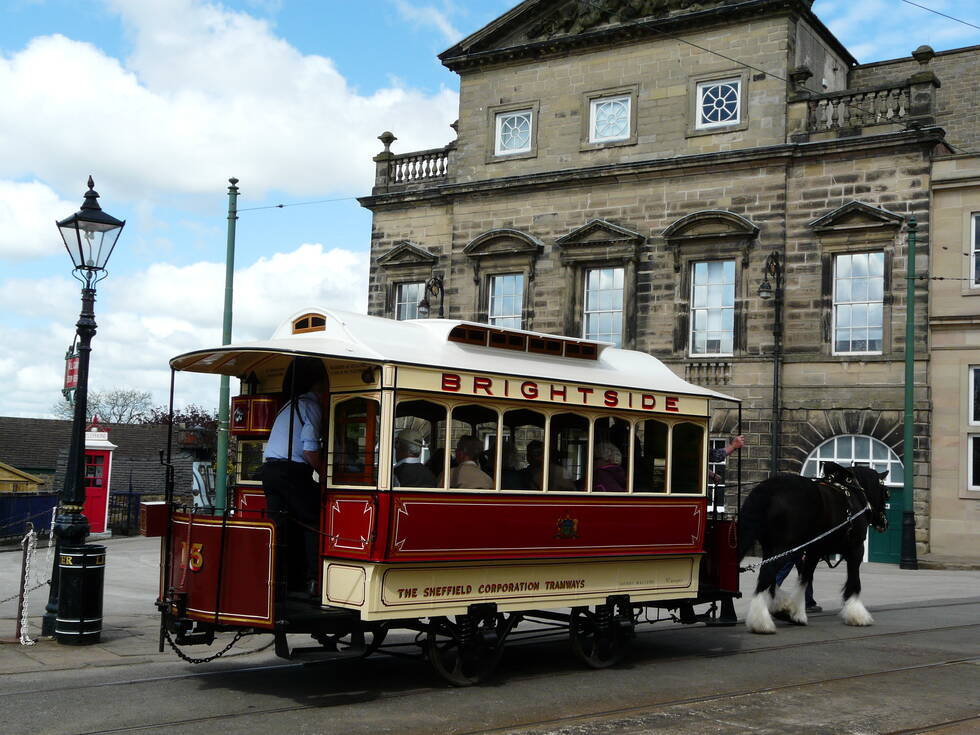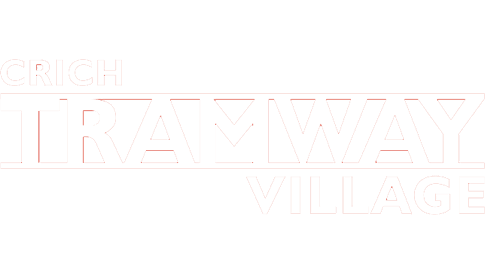June 2nd 2023 marks the 60th anniversary of the first public operation of a horse-drawn tram service at Crich Tramway Village. On this day in 1963, the Tramway Museum at Crich operated its first ever tram service when passengers were able to ride on Sheffield Corporation Tramways horse tram No. 15, with a horse named Bonnie providing the traction. This was almost ninety years since the Sheffield Tramways Company had provided the first horse-drawn tramway service in Sheffield, commencing on 6 October 1873.

Horse tram Sheffield 15 operating at Crich in 1963. Photo courtesy of TMS member John A Senior, who with his wife Carolyn used to collect Bonnie from the nearby farm to walk her to the Museum. They were part of the small team of volunteers who operated the horse tram.
The Tramway Museum Society was founded in 1955 with a mission to save and operate some of the country’s rapidly disappearing tramcars. The site at Crich had been acquired in 1959, and by 1963 more than thirty tramcars had been rescued, the first depots were built, and a short length of running line had been constructed – all thanks to the hard work of volunteers. However, the goal of operating any of the tramcars for the public to ride on had yet to be achieved.
One important task was the preparation of the horse tram itself, which had been purchased by members of the Society in 1959. In 1946, Sheffield Corporation had converted it from a works tram back into its original guise as a horse tram. Further refurbishment took place following transfer to Crich in 1959, which included restoration of its original Sheffield Corporation livery – Brightside car 15. Another essential task involved the acquisition and training of a horse that would be capable of pulling the tramcar. In 1961, the Society acquired a lively ten-year old called Felix in the hope that he might be able to undertake this important role. Once the tramcar had been tested, trials involving Felix began. Sadly, these trials proved unsuccessful, although on 25 August 1962 Felix did operate the first and only trip involving a tram being drawn by a horse owned by the Museum.

The only known photograph of Sheffield 15 being pulled by the original tram horse, Felix, taken on 25th August 1962 – not long before Felix departed to take up active service in the Royal Navy. Photograph by TMS member Bob Tebb.
Horse tram operations are challenging for horses that have not been trained for the purpose, as tramcar wheels offer far less resistance than non-railed vehicles or other heavy loads such as hauling timber. If the same pressure is applied to a tramcar, it can start with a sudden jolt, which is uncomfortable for passengers and could result in serious damage to the structure of the tramcar over time. There is also risk of injury to the back legs of the horse, as there is no shaft to prevent the tramcar from running into it.
Following the early setback with Felix, the museum looked for a replacement horse to train. Fortunately, a more manageable mare called Bonnie was found on a nearby farm and borrowed when required. The first trip to mark the start of public horse tram operations at the Museum took place on a short stretch of line at Crich. After a few trial journeys, tickets were issued to all passengers and the service continued until early evening, carrying 300 passengers during that first day. A similar service was provided every fine Sunday and Bank Holiday Monday until the end of the season. This continued for two years until electric tramcar operations started.

Bonnie undergoing test at Crich Tramway, 15 April 1963. Photo by TMS member Bob Tebb.
Although the distance covered on those early horse tram journeys was relatively short, it represented an important milestone in the history of the Museum: the ability to demonstrate the use of tramcars in action to members of the public. In July 1964, electric tramcar operations began providing a regular service to members of the public. However, horse tram operations at the museum did not end. In recent years, for various reasons, the operation of Sheffield 15 has occurred less often than those early days at the museum. Most recently it has been pulled by Joseph, but as he has now retired, Crich has not seen a horse tram in operation for several years. We hope to resume running at some point, subject to training another new horse recruit!

Joseph the horse pulling Sheffield 15 at Crich Tramway Village in 2015.
Thank you to museum volunteer Jim Dignan for preparing the content for this blog, and to John Senior and Bob Tebb for use of their photographs.
